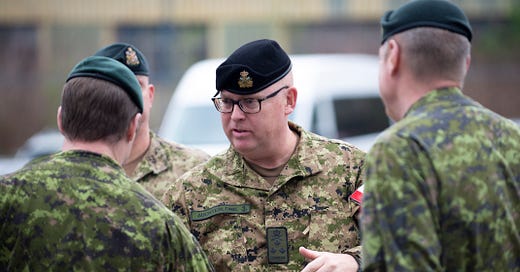"It's taking away from readiness"
A top officer in the Canadian Armed Forces says work at home makes work abroad harder
You know how they say, when you want something done, give it to a busy person? Bob Auchterlonie is here to say there are limits to how well that works.
Vice-Admiral J. Robert Auchterlonie is the Commander of Canadian Joint Operations Command, which coordinates operations that require the different parts of the Canadian Armed Forces to work together. Which is basically all of them. His office asked me for a meeting after I published an interview with Auchterlonie’s colleague, Navy Commander Angus Topshee, about the “critical state” of a navy amid “generational change.”
Auchterlonie’s message was similar: Not one of failure but of concern, in a world where trouble is popping up all over. In Ukraine and the neighbouring NATO front line, the South China Sea and now, once again, in the Middle East, Canada’s military has standing commitments and a list of crises that’s likelier to grow than shrink.
And an ever-growing list of summer tasks at home is adding to the burden, in a way Auchterlonie clearly doesn’t believe is always justified.
In fact, he said, of eight CAF missions in 2023 to respond to natural disasters on Canadian territory, Auchterlonie said only one — evacuating the area around Yellowknife during August wildfires — actually required the Canadian Armed Forces’ military.
That leaves seven that didn’t.
“Demand on the Canadian Forces the last number of years has been escalating at an unsustainable rate,” Auchterlonie said during an extended interview at his office in a CAF building off Highway 417.
“In terms of our support to Canadians — you know, Canadian Armed Forces will always support Canadians, when required. We've just got to make sure that we are required. And I think this has become a challenge in the last number of years. We often are seen as the button that's very easy to push — to reassure Canadians, because we hold forces at readiness to go. I can get people out the door in 12 hours. If something happens, I can move people very quickly. And other organizations don't have that. Therefore, we get asked more than we probably should to do stuff.”
The blanket term for CAF responses to natural disasters in Canada is Operation LENTUS. Since the program’s establishment in 2010, the number of distinct operations under that designation has roughly doubled every five years.
“This summer we conducted Operation LENTUS for over four months straight,” Auchterlonie said. Canada’s military provided “support to Canadians in five different provinces over eight operations, one of which was — I want to be careful how I say this — one of which was entirely necessary. The support for Operation LENTUS and the evacuation and firefighting in and around Yellowknife was absolutely in the wheelhouse of the Canadian Forces as a force of last resort that had unique capabilities that only we could do.”
That means everything else on this list of Op LENTUS activity last summer — including activity in Alberta, Nova Scotia, Quebec, Ontario and British Columbia, mostly during what’s become too familiar to Canadians as wildfire season — fell short of the standard of absolutely requiring help from Canada’s military.
Auchterlonie took care to emphasize that the CAF will never refuse such requests from provinces. He just wishes they weren’t so quick to ask.
“The fact is some of the provinces have exceptional capabilities. BC Wildfire is a phenomenal organization. Alberta Wildfire is a phenomenal organization. They have more airlift and more rotary-wing assets [helicopters] than the Royal Canadian Air Force. They are well resourced, well trained, and they do this every year. They're very good at it.
“The challenge we've been seeing over the last number of years — it's not a new challenge; this is a challenge that's grown over the last 15 years — is, when something bad is happening, to see the folks turn out for the Canadian Armed Forces is very reassuring to Canadians. And I applaud that. That makes you feel really good. The fact is, sometimes the it's within the provinces' capability to [manage a crisis]. They do not necessarily need the assistance of the Canadian Armed Forces. They already have that capacity resident within the province.”
Keep reading with a 7-day free trial
Subscribe to Paul Wells to keep reading this post and get 7 days of free access to the full post archives.




